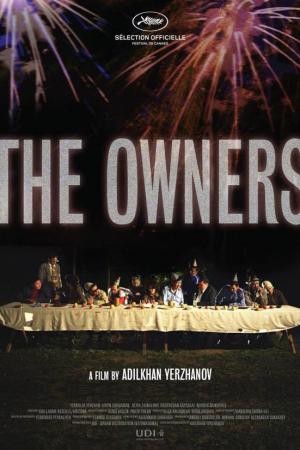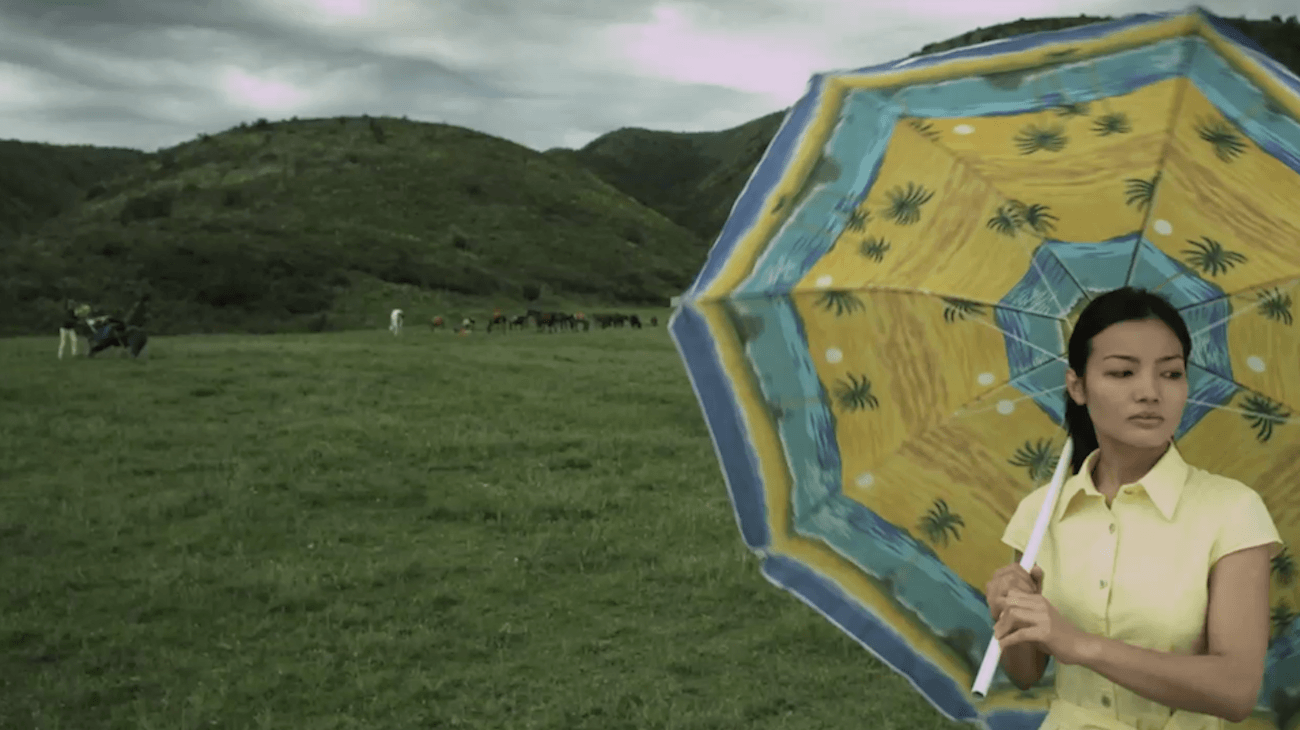
The 50th Chicago International Film Festival
Winner of a Gold Plaque - Special Mention for Originality
Screens at CIFF: 10/10 & 10/12 & 10/15
World premiere: 18 May, 2014, Cannes International Film Festival
Apparently, Adilkhan Yerzhanov's The Owners is not merely the third in a loosely-connected thematic series of tragicomedies about land ownership in Kazakhstan, but it is directly related to his Constructors from 2013, by having two characters played by the same actors appear in both films. I don't know if it would have helped me to know that in advance; Constructors isn't exactly available every which way you look. But what I can say with a certainty is that, in addition to keeping my open for that film or the first in the series, 2011's Realtor, I'll be keeping my eyes and ears open for whatever Yerzhanov does next. The Owners is far from a perfect movie, and it's easier to imagine a viewer who'd be appalled, annoyed, or just plain bored by the excessively surrealist final 15 minutes or so, than one who's utterly enthralled by Yershanov's abandonment of linear narrative in order to more fully plumb the interior psychology of his character's break from reality after a whole film worth of suffering. But, like, not in a bleak realist way. Very important to make that clear - The Owners might be (by which I mean, it certainly is) an exercise in poverty porn and miserabilism, but it stays within a strain of Kafkaesque disorientation that keeps it far, far away from the aching realism that would make it nothing but depressing. If The Owners has an overriding point to its tone, I'd summarise it as "everything is hopeless, so we might as well start dancing".
For dancing is a thing that happens, a lot: if not in reality, than in the touched perspective of teenager Yerbol (Yerbolat Yerzhan), one of three siblings who ends up homeless in the lawless and mad eastern part of Kazakhstan. The others are John (Aidyn Sakhaman) and young Aliya (Aliya Zainalova), all of them forced by economic need to travel into the deep country where their late mother left them a house. But when they arrive, they find it in possession of the bullying gangster-like Zhuba (Bauyrzhan Kaptagai), in bed with the cops and not remotely interested in letting a bunch of kids bother him. Thus begins a nihilistic fairy tale about the impossible of getting anything accomplished in a country run by a literally faceless bureaucracy (governmental oversight is embodied by a pair of agitated hands viewed through a gap in an ancient, rusted door), and where things like logic and fairness are banished as thoroughly as from The Trial or Alice in Wonderland, or any other place where human greed and arbitrary rules that change every time you blink rule. That this turns out violently is no surprise - it's basically a looking-glass version of an American Western with a bitter ex-Soviet attitude and an anti-funny sense of humor. The exact way it turns out violently, however, is frequently surprising and fresh, even as it gets increasingly grim.
To tell his story about a broken, confusing, arbitrary world, Yerzhanov employs a broad mixture of styles: lingering, stilted shots of grubby realism intercut jarringly with elaborate and complicated tableaux, moments of bullying cruelty fade invisibly into black comedy, and then explode in fever-dream moments of slapstick and farce. Yerbol is the best equivalent the film has to a lead, and his perspective is throughout is easily shaken and confused, possibly because he's seeing the truth of things and possibly just because he's suffering from an undiagnosed psychological ailment. It's through his eyes that the film's attains moments of poetic beauty (a woman keeps drifting in who is likely meant to be the siblings' mother, guiding her son), its most warped visual comedy, and its general aura of unpredictable weirdness, though the film seems unreal generally: soft lighting and focus give the whole movie the feeling of being a dream. A terrible dream, one that you can't wake up from, until shocked out of it by a violent act. And it's telling that the moments in the film which are least florid and strange are the ones which are most brutal and unexpected.
This world as a madhouse of fantasy, dancing, and weird caricatures of henchmen crouching around every corner, as seen by a hugely unreliable POV figure, paints a pretty unmistakable picture of impotence and hopelessness. Yerzhanov set off to make a film about a capricious, broken world, and by God, but he did a thorough job of it. Even when it's funny (and it frequently is), The Owners always has an unpleasant undertone, and when it's depressing, it's really depressing, perhaps lapsing into bleakness as a way to justify its explosions of weird energy. The world is unremittingly terrible, and it can't be beaten, is the film's overt message, so we might as well treat it as an absurd joke, just to survive it a bit longer. It's not joyful, and even less optimistic, but its reduction of all the world to a ridiculous, straight-face joke keeps it from being miserable. It's absolutely captivating, in fact, though in a highly idiosyncratic way that's almost impossible for me to imagine recommending to anybody.
8/10
Screens at CIFF: 10/10 & 10/12 & 10/15
World premiere: 18 May, 2014, Cannes International Film Festival
Apparently, Adilkhan Yerzhanov's The Owners is not merely the third in a loosely-connected thematic series of tragicomedies about land ownership in Kazakhstan, but it is directly related to his Constructors from 2013, by having two characters played by the same actors appear in both films. I don't know if it would have helped me to know that in advance; Constructors isn't exactly available every which way you look. But what I can say with a certainty is that, in addition to keeping my open for that film or the first in the series, 2011's Realtor, I'll be keeping my eyes and ears open for whatever Yerzhanov does next. The Owners is far from a perfect movie, and it's easier to imagine a viewer who'd be appalled, annoyed, or just plain bored by the excessively surrealist final 15 minutes or so, than one who's utterly enthralled by Yershanov's abandonment of linear narrative in order to more fully plumb the interior psychology of his character's break from reality after a whole film worth of suffering. But, like, not in a bleak realist way. Very important to make that clear - The Owners might be (by which I mean, it certainly is) an exercise in poverty porn and miserabilism, but it stays within a strain of Kafkaesque disorientation that keeps it far, far away from the aching realism that would make it nothing but depressing. If The Owners has an overriding point to its tone, I'd summarise it as "everything is hopeless, so we might as well start dancing".
For dancing is a thing that happens, a lot: if not in reality, than in the touched perspective of teenager Yerbol (Yerbolat Yerzhan), one of three siblings who ends up homeless in the lawless and mad eastern part of Kazakhstan. The others are John (Aidyn Sakhaman) and young Aliya (Aliya Zainalova), all of them forced by economic need to travel into the deep country where their late mother left them a house. But when they arrive, they find it in possession of the bullying gangster-like Zhuba (Bauyrzhan Kaptagai), in bed with the cops and not remotely interested in letting a bunch of kids bother him. Thus begins a nihilistic fairy tale about the impossible of getting anything accomplished in a country run by a literally faceless bureaucracy (governmental oversight is embodied by a pair of agitated hands viewed through a gap in an ancient, rusted door), and where things like logic and fairness are banished as thoroughly as from The Trial or Alice in Wonderland, or any other place where human greed and arbitrary rules that change every time you blink rule. That this turns out violently is no surprise - it's basically a looking-glass version of an American Western with a bitter ex-Soviet attitude and an anti-funny sense of humor. The exact way it turns out violently, however, is frequently surprising and fresh, even as it gets increasingly grim.
To tell his story about a broken, confusing, arbitrary world, Yerzhanov employs a broad mixture of styles: lingering, stilted shots of grubby realism intercut jarringly with elaborate and complicated tableaux, moments of bullying cruelty fade invisibly into black comedy, and then explode in fever-dream moments of slapstick and farce. Yerbol is the best equivalent the film has to a lead, and his perspective is throughout is easily shaken and confused, possibly because he's seeing the truth of things and possibly just because he's suffering from an undiagnosed psychological ailment. It's through his eyes that the film's attains moments of poetic beauty (a woman keeps drifting in who is likely meant to be the siblings' mother, guiding her son), its most warped visual comedy, and its general aura of unpredictable weirdness, though the film seems unreal generally: soft lighting and focus give the whole movie the feeling of being a dream. A terrible dream, one that you can't wake up from, until shocked out of it by a violent act. And it's telling that the moments in the film which are least florid and strange are the ones which are most brutal and unexpected.
This world as a madhouse of fantasy, dancing, and weird caricatures of henchmen crouching around every corner, as seen by a hugely unreliable POV figure, paints a pretty unmistakable picture of impotence and hopelessness. Yerzhanov set off to make a film about a capricious, broken world, and by God, but he did a thorough job of it. Even when it's funny (and it frequently is), The Owners always has an unpleasant undertone, and when it's depressing, it's really depressing, perhaps lapsing into bleakness as a way to justify its explosions of weird energy. The world is unremittingly terrible, and it can't be beaten, is the film's overt message, so we might as well treat it as an absurd joke, just to survive it a bit longer. It's not joyful, and even less optimistic, but its reduction of all the world to a ridiculous, straight-face joke keeps it from being miserable. It's absolutely captivating, in fact, though in a highly idiosyncratic way that's almost impossible for me to imagine recommending to anybody.
8/10
Categories: central asian cinema, ciff, domestic dramas, thrillers






